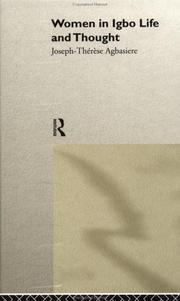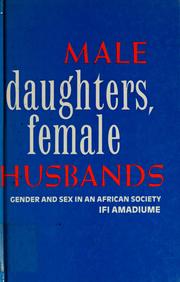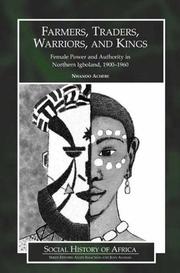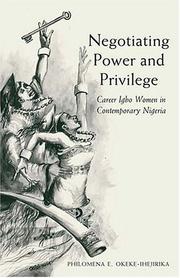| Listing 1 - 6 of 6 |
Sort by
|

ISBN: 0415227038 0415227046 Year: 2000 Publisher: London : New York : Routledge,
Abstract | Keywords | Export | Availability | Bookmark
 Loading...
Loading...Choose an application
- Reference Manager
- EndNote
- RefWorks (Direct export to RefWorks)
Women, Igbo. --- Philosophy, Igbo --- Femmes ibo --- Philosophie Ibo --- #SBIB:39A73 --- #SBIB:316.346H20 --- Etnografie: Afrika --- Positie van de vrouw in de samenleving: algemeen --- Philosophy, Igbo. --- Women, Igbo --- Igbo women --- Women, Igbo (African people) --- Igbo philosophy --- Philosophy, Igbo (African people)
Book
ISBN: 1280127090 9786613530950 1552384969 1552382680 9781280127090 9781552384961 Year: 2010 Publisher: Calgary [Alta.] : University of Calgary Press,
Abstract | Keywords | Export | Availability | Bookmark
 Loading...
Loading...Choose an application
- Reference Manager
- EndNote
- RefWorks (Direct export to RefWorks)
"A century ago, agriculture was the dominant economic sector in much of Africa. By the 1990s, however, African farmers had declining incomes and were worse off, on average, than those who did not farm. Colonial policies, subsequent 'top-down' statism, and globalization are usually cited as primary causes of this long-term decline. In this unprecedented study of the Igbo region of southeastern Nigeria, author Chima Korieh points the way to a more complex and inclusive approach to this issue. Using agricultural change as a lens through which to view socio-economic and cultural change, political struggle, and colonial hegemony, Korieh shows that regional dynamics and local responses also played vital roles in this era of transformation. British attempts to modernize the densely populated Igbo region were focused largely on intensive production of palm oil as a cash crop for export and on the assumption of male dominance within a conventional western hierarchy. This colonial agenda, however, collided with a traditional culture in which females played important social and political roles and male status was closely tied to yam cultivation. Drawing on an astonishing array of sources, including oral interviews, newspapers, private journals, and especially letters of petition from local farmers and traders, Korieh puts the reader in direct contact with ordinary people, evoking a feeling of what it was like to live through the era. As such, the book reveals colonial interactions as negotiated encounters between officials and natives and challenges simplistic notions of a hegemonic colonial state and a compliant native population."--P. [4] of cover.
Igbo (African people) --- Women, Igbo --- Agriculture --- Agriculture and state --- History. --- Social conditions. --- Economic conditions. --- Social aspects --- Great Britain --- Colonies
Book
Year: 2010 Publisher: Calgary : University of Calgary Press,
Abstract | Keywords | Export | Availability | Bookmark
 Loading...
Loading...Choose an application
- Reference Manager
- EndNote
- RefWorks (Direct export to RefWorks)
A century ago, agriculture was the dominant economic sector in much of Africa. By the 1990s, however, African farmers had declining incomes and were worse off, on average, than those who did not farm. Colonial policies, subsequent 'top-down' statism, and globalization are usually cited as primary causes of this long-term decline. In this unprecedented study of the Igbo region of southeastern Nigeria, Chima Korieh points the way to a more complex and inclusive approach to this issue. Using agricultural change as a lens through which to view socio-economic and cultural change, political struggle, and colonial hegemony, Korieh shows that regional dynamics and local responses also played vital roles in this era of transformation. British attempts to modernize the densely populated Igbo region were focused largely on intensive production of palm oil as a cash crop for export and on the assumption of male dominance within a conventional western hierarchy. This colonial agenda, however, collided with a traditional culture in which females played important social and political roles and male status was closely tied to yam cultivation. Drawing on an astonishing array of sources, including oral interviews, newspapers, private journals, and especially letters of petition from local farmers and traders, Korieh puts the reader in direct contact with ordinary people, evoking a feeling of what it was like to live through the era. As such, The Land Has Changed reveals colonial interactions as negotiated encounters between officials and natives and challenges simplistic notions of a hegemonic colonial state and a compliant native population.
Igbo (African people) --- Women, Igbo --- Agriculture --- Agriculture and state --- History --- Social conditions --- Economic conditions --- Social aspects --- Economic conditions. --- Social conditions. --- History. --- Social aspects.

ISBN: 0862325951 0862325943 9780862325947 9780862325954 9781783603336 178360333X 9781783603343 1783603348 1350221252 Year: 2015 Publisher: London : Zed Books,
Abstract | Keywords | Export | Availability | Bookmark
 Loading...
Loading...Choose an application
- Reference Manager
- EndNote
- RefWorks (Direct export to RefWorks)
An early study of queer theory and non-Western feminism, challenging the concept of gender.
Sociology of the family. Sociology of sexuality --- Nigeria --- Women, Igbo --- Igbo (African people) --- Femmes ibo --- Ibo (Peuple d'Afrique) --- Woman-to-woman marriage --- Women, Igbo. --- Sex role --- Social life and customs. --- Rôle selon le sexe --- Social life and customs --- Moeurs et coutumes --- Igbo (African people) -- Social life and customs. --- Sex role -- Nigeria. --- Woman-to-woman marriage -- Nigeria.

ISBN: 0325070784 0325070792 0325070784 Year: 2005 Publisher: Portsmouth, NH : Heinemann,
Abstract | Keywords | Export | Availability | Bookmark
 Loading...
Loading...Choose an application
- Reference Manager
- EndNote
- RefWorks (Direct export to RefWorks)
Women, Igbo --- Igbo (African people) --- Femmes ibo --- Ibo (Peuple d'Afrique) --- History --- Social conditions. --- King and rulers. --- Social life and customs. --- Histoire --- Conditions sociales --- Rois et souverains --- Moeurs et coutumes --- Nsukka (Nigeria) --- Politics and government.

ISBN: 0896802418 Year: 2004 Volume: 82. Publisher: Athens [Ohio] : Center for International Studies, Ohio University,
Abstract | Keywords | Export | Availability | Bookmark
 Loading...
Loading...Choose an application
- Reference Manager
- EndNote
- RefWorks (Direct export to RefWorks)
Women, Igbo --- Women employees --- Working mothers --- Sex role --- Women --- Sexual division of labor --- Femmes ibo --- Personnel féminin --- Mères au travail --- Rôle selon le sexe --- Femmes --- Division sexuelle du travail --- Social conditions. --- Economic conditions. --- Employment. --- Government policy --- Conditions sociales --- Conditions économiques --- Travail --- Politique gouvernementale --- Nigeria --- Nigéria
| Listing 1 - 6 of 6 |
Sort by
|

 Search
Search Feedback
Feedback About UniCat
About UniCat  Help
Help News
News